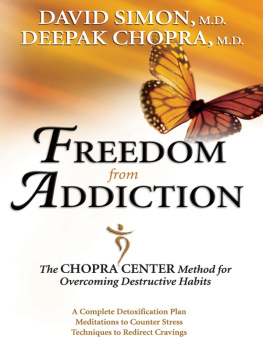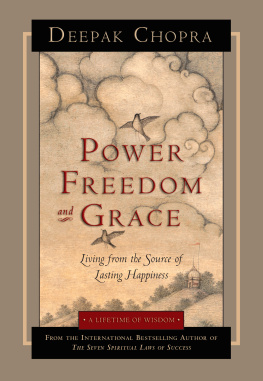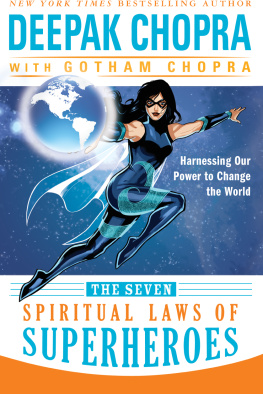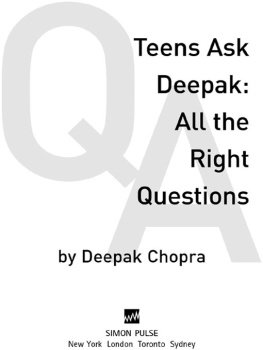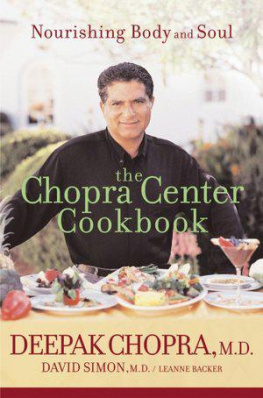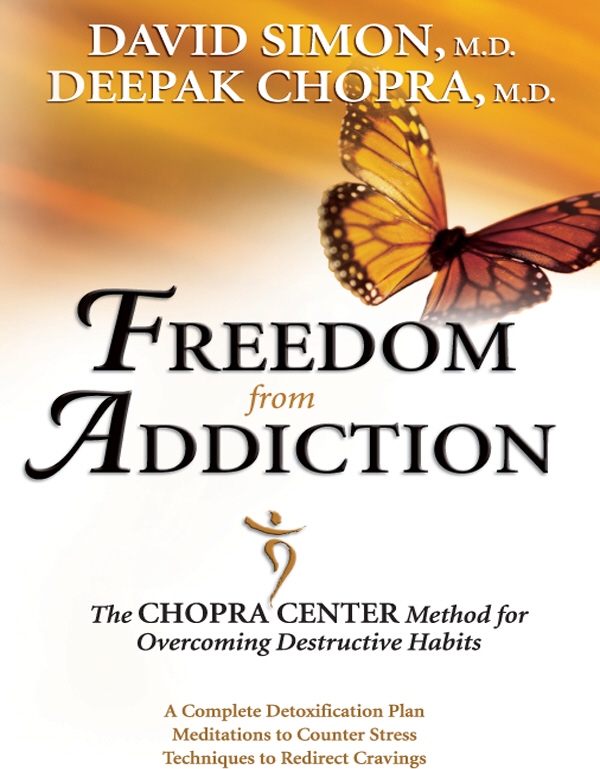
FREEDOMfromADDICTION
DAVID SIMON, M.D.
DEEPAK CHOPRA, M.D.
F REEDOM
from
A DDICTION

The CHOPRA CENTER Method for
Overcoming Destructive Habits

Health Communications, Inc.
Deerfield Beach, Florida
www.hcibooks.com
Library of Congress Cataloging-in-Publication Data
Simon, David.
Freedom from addiction : the Chopra Center method for overcoming destructive habits / David Simon & Deepak Chopra.
p. cm.
Includes bibliographical references.
eISBN-13: 978-0-7573-9876-6 (ebook) eISBN-10: 0-7573-9876-6 (ebook)
1. Substance abusePrevention. 2. Self-actualization (Psychology) 3. Healing. 4. Mental healing. 5. Spiritual healing. 6. Emotional maturity. I. Chopra, Deepak. II. Chopra Center for Wellbeing.
III. Title.
HV4998.S56 2008
616.86'06dc22
2007012741
2007 David Simon and Deepak Chopra
All rights reserved. Printed in the United States of America. No part of this publication may be reproduced, stored in a retrieval system or transmitted in any form or by any means, electronic, mechanical, photo copying, recording or otherwise, without the written permission of the publisher.
HCI, its logos and marks are trademarks of Health Communications, Inc.
Publisher: Health Communications, Inc.
3201 S.W. 15th Street
Deerfield Beach, FL 33442-8190
Cover design by Larissa Hise Henoch
Inside book design by Dawn Von Strolley Grove
Contents
Introduction
Chapter 2 Expanding the Steps to Freedom
Chapter 7 Emotional Emancipation
IACCEPT THATIAMan alcoholic, Dan confessed, but I just canthandle going to A.A. meetings. I feel more depressed than inspired byeveryones stories, and I dont like the idea that the central focus for therest of my life has to be defining myself as powerless.
Although Dan had been sober for over three years, he felt the needto see his drinking problem in a new light. He wanted to see if hecould redefine himself in a way that allowed for personal growth.

W e live on a planet that offers many potential addictions. As a human being, you have almost certainly engaged in a habit that seemed to call to you, even though it had undesirable side effects. People have a great capacity to participate in behaviors that provide momentary pleasure only to extract an emotional or physical toll. Although relatively few of us inject heroin or smoke crack cocaine, many among us overeat, overdrink, overthink, smoke cigarettes, compulsively buy things we do not need, gamble away our hard-earned money, and otherwise make choices that do not nourish our bodies, minds, or souls.
Indeed, addiction is the most widespread problem in our society. The emotional and physical pain experienced by people with addictions and their families is incalculable. The direct and indirect economic costs of addiction exceed hundreds of billions of dollars worldwide. Yet we are losing the war on drugs because we have failed to recognize that the enemy is a hidden aspect of ourselves, a subconscious drive to sacrifice long-term peace for short-term relief. This book is our effort to reframe the conflict surrounding addiction and expand your opportunities for lasting peace.
Whats New in Recovery?
Over the past seventy years, millions of people seeking to overcome addictive behaviors have embarked on a Twelve-Step program. First introduced as the basic tenets of Alcoholics Anonymous (A.A.), the Twelve Steps have been adopted by many other support groups, including, but not limited to, Narcotics Anonymous, Cocaine Anonymous, Overeaters Anonymous, Gamblers Anonymous, Sexaholics Anonymous, Debtors Anonymous, Eating Disorders Anonymous, and Workaholics Anonymous. For those who can embrace the basic principles and appreciate the community of others waging their own battles against personal demons, Twelve-Step programs provide valuable support.
The Twelve Steps are not for everyone, however. For some, the religious overtones are incompatible with their core personal beliefs, while for others, the Twelve Steps are not religious enough. The most common reason we hear at the Chopra Center for why people do not resonate with A.A. is its emphasis on personal powerlessness. Most secular and religious philosophies highlight the principle that we are responsible for our choices in life. The first step in Twelve-Step programs requires an admission of powerlessness that some people are not able or willing to embrace. The implication that people with bad habits must consider themselves lifelong victims of an incurable condition is, for some, untenable. For those who believe free will is a distinguishing feature of human beings, admitting that one has lost free will stops the recovery process before it begins.
The Twelve-Step response to this criticism is that addicts have lost the ability to freely choose because they are so impaired by their addiction. Recognizing this, the first step requires an admission that the addict is powerless over the addiction, while the second step requires embracing the belief that a greater power is required to restore sanity.
We think its possible to reconcile the opposing viewpoints of choice versus powerlessness. The Chopra Center philosophy and approach to addiction highlights the paradox that every life seeks to resolvethe apparent conflict between our individuality and our universality.
The Paradox of Individuality
Versus Universality
Life can be challenging, and there are times when we feel compelled to alleviate the distress quickly. Behaviors that temporarily anesthetize the pain and anxiety of loss, disappointment, separation, alienation, frustration, or loneliness can develop into habits and addictions that trade short-term relief for longer-term distress. This natural impulse to do or take whatever is necessary to relieve the distress is the basis of addiction. Our goal is to offer you better alternatives to coping with lifes challenges and disappointments.
As individuals we all have specific intentions and desires, which we strive to manifest through our choices and actions. We develop habits of behavior in our quest to satisfy our needs for security, self-esteem, sensory gratification, power, and material acquisition. These are the needs of our individuality, which we try to fill with things outside of ourselves. And yet, at another level, we recognize that our emptiness inside cannot be filled from outside. Our compulsion to acquire, attain, accomplish, and achieve will not lead to lasting peace or inner satisfaction. A spiritual life seeks to integrate the quest to fulfill our individual needs through the power of intention with an internal state of peace and contentment generated through the power of surrender. Knowing when to exercise will and when to accept things as they are requires skill and finesse.
Changing Habits with
the Chopra Center Perspective
If you drive down the same dirt road day after day, your car will form ruts in the road that will limit your ability to maneuver. Unless you pay attention and become mindful, your car will default to the ruts, and in doing so, reinforce the prior patterns in the dirt. If you want to get out of the rut, you will need to consciously choose another path and reinforce this new path until it becomes your established way of traveling. Similarly, the principles in this book offer a new path to travela path to freedom.
Next page
